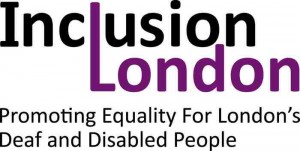
By John Pring Disability News Service 2nd March 2017
The government should replace its “deeply flawed and inaccurate” disability benefits assessments with an in-house system – based on the social model – that understands the barriers faced by Deaf and disabled people, according to a disabled people’s organisation.
Inclusion London said the government’s Improving Lives green paper on work, health and disability had missed the chance to base its social security policy on a social model approach and move away from one based on the “discredited” biopsychosocial model.
In its response to the government’s consultation on its green paper, Inclusion London calls on ministers to replace the assessment processes for both employment and support allowance (ESA) and personal independence payment (PIP).
It warns that Deaf and disabled people will be moved further from employment because of the green paper’s failure to reform the “failing” assessment systems, and reverse the imminent cuts to payments to new ESA claimants placed in the work-related activity group (WRAG).
It calls on the government to halt its plans to cut the WRAG payments – due to be implemented next month – and instead carry out an independent review to assess what the impact of the cuts will be, including increased costs to the NHS and social care.
Otherwise, it warns, there is “a strong danger that serious harm could be done to disabled people and their families”.
Inclusion London says the green paper implies that if disabled people “are encouraged to think more positively about work and nudged to change their behaviour they will be able to successfully find and stay in employment, regardless of the effects of living with their impairment”.
But by “overplaying the effectiveness of coercive approaches”, it says, the government’s biopsychosocial approach will move Deaf and disabled people further from the labour market, and cause “considerable and unnecessary suffering”.
And it warns that continuing to target policy on cutting social security spending, regardless of the needs of Deaf and disabled people, will “ultimately waste resources while retrogressing our rights”.
It says the government has “overlooked” the “substantive” barriers to work caused by the lack of independent living support, cuts to mental health services, and “damaging” changes to the Access to Work (AtW) scheme, which have seen “a focus on reducing support”, hostile advisers and a new cap on high-cost packages.
It also warns that the failure to address the social care funding crisis – including the ongoing impact of the closure of the Independent Living Fund – will “unquestionably” lead to the government missing its target of halving the disability employment gap.
Among its recommendations is for the government to set up an independent living taskforce that would develop proposals for a national system of support that was independent of local authorities.
It calls for ministers to reverse the tightening of the eligibility criteria for the mobility component of PIP, which they cut from 50 metres to 20 metres.
And it calls on the Department for Work and Pensions to expand AtW, allowing it to be used by those carrying out voluntary work, and reverse the changes that have “undermined [its] effectiveness”.
Inclusion London also says it is “extremely concerned” about the “damaging effects of linking therapeutic interventions and treatment to employment outcomes”.
It says that both mental health professionals and service-users “have been vocal in their concerns about the dangers of co-locating job/work coaches in health or mental health treatment settings”, with the fear that disabled people will avoid seeking the treatment they need because of their fear of benefit cuts.
It also urges the government to scrap all benefits sanctions, or at least provide an exemption for all disabled people.
It provides 12 case studies from one of its member organisations of disabled people whose mental health has been harmed by discriminatory sanctions, or threats of sanctions, linked to being forced to use DWP’s Universal Jobmatch online job-searching service.
Instead of backing away from such sanctions, the green paper now threatens to impose “mandatory” requirements on those in the ESA support group.
Inclusion London says that any participation in work-focused activity offered to claimants in the support group “must be strictly voluntary”.
